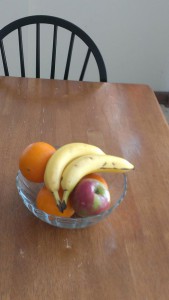Often it’s the little details and ordinary rituals that determine our happiness, rather than the major events and big-ticket purchases. Although our consumer culture insists that comfort has a price tag, what we buy doesn’t necessarily change how we feel about ourselves. Arranging things comfortably can make a lot more difference. An expensive new car, for instance, may not make driving all that much more pleasant if the garage is full of junk and the car has to be parked outside in the snow and ice.
This winter I’ve made a point of keeping a glass fruit bowl on the kitchen table, filled with navel oranges, McIntosh apples, and bananas. It’s meant to be a symbol of abundance in general; but I have noticed that there are also more specific positive effects, in addition to general feelings of well-being.
When the kitchen table lacks a centerpiece, it tends to get used as a shelf and to get covered with clutter. That in turn causes depressing feelings of disorganization and time pressure, such as that the house is a mess and it will take forever to get everything clean. If I let those feelings get out of control, I’m likely to neglect some household chores and end up with a real mess. A fruit bowl on the kitchen table avoids this unfortunate result by making clear, through its presence, that the table has been arranged with care and is not a random junk repository.
Keeping a fruit bowl where I’ll see it every time I walk into the kitchen gives me an effective visual prompt for healthy eating. Even though I know that fruit has a lot of good nutrients and fiber, if the fruit is tucked away in the refrigerator drawer then it’s “out of sight, out of mind,” and other, less healthy snacks may come to mind instead. Seeing the fruit makes me more likely to think “Yum, apple,” and eat it.
McIntosh apples are my preferred variety, but the supermarket where I regularly shop no longer stocks them; it seems they’re not as popular as they used to be. So I have to make a trip to another store just to buy apples. At first I thought the extra errand was a nuisance; but on reflection, I’ve decided to consider it a self-nurturing ritual and to be grateful for it. Every time I see McIntosh apples in the fruit bowl, they subconsciously improve my mood by reminding me that I am willing to go out of my way—literally—to do small things to make myself happier.
And one more thing about eating fruit – it’s a great opportunity for mindfulness.
Nurturing Thursday was started by Becca Givens and seeks to “give this planet a much needed shot of fun, support and positive energy.” Visit her site to find more Nurturing Thursday posts and a list of frequent contributors.


